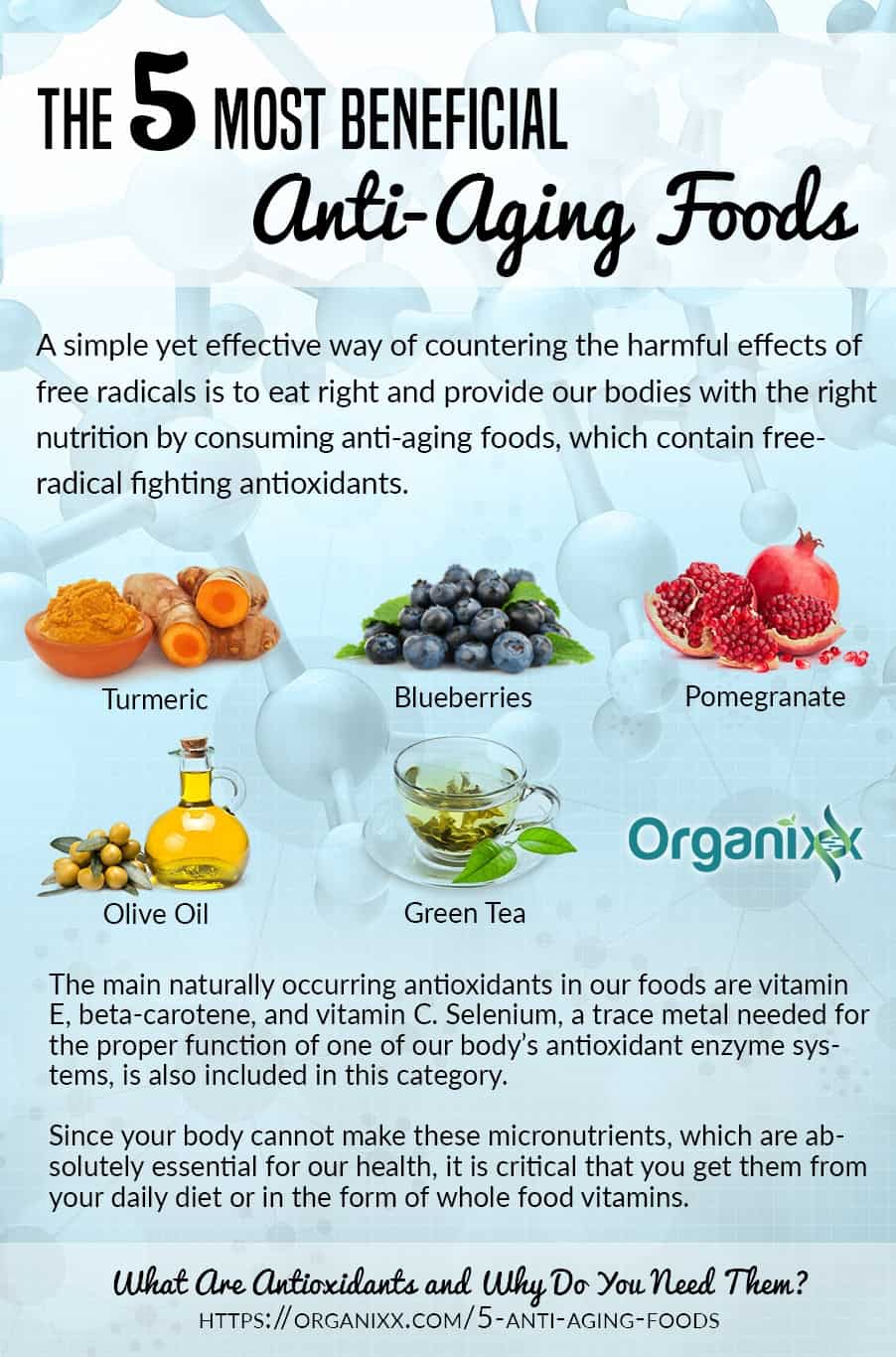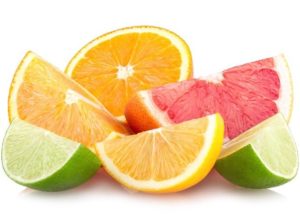The 5 Most Beneficial Anti-Aging Foods
In a hurry? Click here to read the Article Summary...
Aging is the sum total of all the changes that happen to us over the course of our lifetimes from birth to death. Aging is fun when it means celebrating milestone birthdays that allow us “grown up” privileges such as driving or voting.
When we reach middle age, however, we begin to notice less than welcome features such as graying hair, sagging skin and wrinkles – and what’s worse, progressive mental and physical decline.
Even the very fit don’t escape the ravages of Father Time. Aging has been shown to slow down the times of marathon runners and affect the performances of elite athletes and chess grandmasters. Age-associated cognitive decline or a reduction in brain power and memory can happen to anyone as they get older.
Another worrying aspect is that many people become more susceptible to infections and diseases with age. Sometimes it can be hard to separate age-related changes from the onset of an infection or debilitating disease.
For instance, a common belief is that people become cranky, depressed, and withdrawn as they get older. But people’s personalities do not change that much as they grow older. Instead, studies have shown that such significant changes in personality and behavior may be an early indication of disease or dementia.
Aging can affect cells in every major organ in your body, yet many questions still remain as to what triggers aging, why it happens, and what exactly are the biological processes underlying these changes.
So, just why do these changes happen… and what anti-aging steps (if any) can be taken to delay these changes as long as possible?
To answer this question, let’s take a look at the so-called “free radical theory of disease and aging.”
What Are Antioxidants and Why Do You Need Them?
 Antioxidants are molecules which neutralize harmful free radicals and protect vital cellular structures in your body from their damaging effects.
Antioxidants are molecules which neutralize harmful free radicals and protect vital cellular structures in your body from their damaging effects.
Many antioxidants can be obtained naturally from the foods you eat. Your body also contains antioxidant enzyme systems.
To understand why antioxidants are important for your health, let’s first understand what free radicals are and what they do.
Understanding Free Radicals
Free radicals are highly reactive chemicals that are formed daily in your body – usually in manageable amounts – as a result of normal metabolic activity.
Being very unstable, free radicals typically attack the nearest stable molecule and “steal” its electron. When the “attacked” molecule loses its electron, it becomes a free radical itself, thus beginning a chain reaction.
Once this process is started, it can become a cascade, damaging vital structures such as the outer protective membrane of your body’s cells, cellular proteins, and even DNA.
How Oxidative Stress Is Created
For instance, free radicals known as reactive oxygen species (ROS) are made in your body when oxygen is used to burn fuel and make energy. Getting rid of ROS is essential for life and is normally carried out by your innate antioxidant enzyme system.
However, when too much ROS or other free radicals are formed – for example, when you’re exposed to toxic chemicals, infections, and diseases – and your body’s detoxification enzyme system is no longer able to cope, it leads to a situation known as “oxidative stress.”
We all know aging is inevitable… Is there a way to slow it down? Watch this video to discover the five best anti-aging foods designed by nature that have the potential to make you look and feel better than ever.
Thanks to the ever-increasing levels of toxic chemical pollution including factory and automobile exhaust, UV radiation from the sun, cigarette smoke, pesticides, herbicides, household cleaners, and hundreds of other synthetic products in every aspect of our environment, we’re now being bombarded with many more free radical attacks than ever before. As a result our bodies are experiencing much more oxidative stress than they’re equipped to handle.
Oxidative stress and other forms of free radical-induced damage is believed to be involved in the development of heart disease and stroke, as well as high blood pressure, diabetes, cancer, Alzheimer’s disease and other age-related conditions, while also contributing to overall aging.
This is known as the “free radical theory of disease and aging.”
A simple yet effective way of reducing the effects of free radicals is to eat right and provide your body with the right nutrition by consuming anti-aging foods and supplements, which contain free-radical fighting antioxidants.
Are These Anti-Aging Foods Part of Your Diet?
Let’s take a look at a few of the best anti-aging foods and food components and understand how they may be able to help fight disease and slow down the effects of aging.
 Anti-aging Food #1: Blueberries
Anti-aging Food #1: Blueberries
Blueberries, which belong to the same North American family as cranberries and bilberries, have been shown to lower cholesterol levels, improve glucose control and insulin sensitivity, and lower the risk of subsequent heart disease and diabetes.
These delicious fruits have the highest antioxidant capacity of all fresh fruit because of their anthocyanin, vitamin C, and vitamin E content. Blueberries also contain significant amounts of vitamin A, selenium, zinc, and iron.
Excitingly, blueberries have been shown to help improve memory. In a study involving older adults, 12 weeks of blueberry consumption improved their brain function and memory scores.
Blueberries have also been shown to help slow down age-related vision loss in clinical studies, especially macular degeneration, cataracts, and other retinal disorders. This is because blueberries contain the carotenoid antioxidants lutein and zeaxanthin, which have been shown to directly benefit retinal health.
Additionally, blueberries may help to protect skin against free radical damage because of sun exposure. Regular blueberry consumption has been shown to reduce muscle soreness after exercise, especially running. Just be sure to consume organic blueberries, otherwise you could be taking in harmful pesticides along with the berries. (Tip: wild blueberries grown in an area free from pesticides are even better!)
Anti-aging Food #2: Turmeric
 Turmeric – the yellow-colored root spice in curry dishes – has a long history of use in Ayurveda, the traditional Indian system of medicine. Modern science is still uncovering a growing list of diseases that may be effectively and safely treated by the more than 300 bioactive components in turmeric.
Turmeric – the yellow-colored root spice in curry dishes – has a long history of use in Ayurveda, the traditional Indian system of medicine. Modern science is still uncovering a growing list of diseases that may be effectively and safely treated by the more than 300 bioactive components in turmeric.
Evidence presented in the Journal of the American Chemical Society in 2009 suggests a close link between inflammation, oxidative stress, and the risk of developing many chronic diseases.
A study assessing the effectiveness of various anti-inflammatory compounds found that curcumin – one of the main bioactive ingredients in turmeric – was one of the most effective, comfortably beating aspirin and ibuprofen.
Many diseases are triggered or made worse by inflammation, including:
- Arthritis
- Ulcerative colitis
- Diabetes
- High cholesterol
- Heart disease
- Many types of cancer
- Alzheimer’s disease
Curcumin and other curcuminoid antioxidants in turmeric can help to support healthy inflammation levels in the body.
The prevalence of Alzheimer’s disease in older Indian adults is 4-5 times less than that of American adults. Some experts believe this is because Indians consume between 25-50 milligrams (mg) of turmeric daily in their food over their entire lifetimes, and preliminary scientific evidence appears to support this view.
 Anti-aging Food #3: Green Tea
Anti-aging Food #3: Green Tea
Green tea contains many powerful antioxidants including polyphenols known as catechins, which can benefit the body by fighting free radical-induced susceptibility to disease and adverse effects of aging.
Research published by the Journal of Indian Society of Periodontology in 2012 reports that people who regularly drink green tea are less likely to get common bacterial and viral infections. In other words, green tea consumption assists in boosting the immune system.
The Ohsaki National Health Insurance Cohort Study that followed over 40,000 Japanese participants for 11 years showed that participants who drank 5 or more cups of green tea daily had a significantly lower risk of dying due to all causes, especially cardiovascular disease, likely by lowering cholesterol and triglyceride levels. Drinking green tea regularly has also been associated with a reduced risk of stroke.
Epigallocatechin-3-gallate (EGCG) is the most abundant polyphenol antioxidant in green tea. Laboratory studies published in the Archives of Biochemistry and Biophysics have indicated that EGCG and other green tea antioxidants may be toxic to cancer cells, while population studies indicate that green tea consumption may be associated with a lower risk for many cancers.
Anti-aging Food #4: Pomegranates
Pomegranates are incredibly healthy fruits, chock full of antioxidant, antibacterial, and antiviral properties. They are an excellent source of vitamin A, vitamin C, vitamin E, and folic acid.
Traditionally, pomegranates are believed to be so useful for maintaining healthy blood circulation that some doctors recommend eating them regularly to regain strength after a long illness.
Pomegranates have also been used to assist with clearing up the skin and lowering blood pressure, along with relieving pain, severity of arthritis, and joint inflammation associated with osteoarthritis.
According to another study, antioxidants in pomegranates – including ellagic acid and punicalagin – can prevent harmful oxidization of LDL cholesterol, one of the first steps in the development of heart disease.
In fact, a 2014 study in the journal Advanced Biomedical Research showed that regular consumption of pomegranate juice has been shown to reduce atherosclerotic lesions, lowering the risk of heart attacks and strokes.
You’ve likely heard that eating fruits and vegetables can help to lower cancer risk. One reason is because fruits & veggies contain powerful plant chemicals known as flavonoids. Pomegranates are an excellent source of these cancer-fighting flavonoid antioxidants.
Anti-aging Food #5: Olive Oil
 Olive oil, rich in monounsaturated fatty acids (MUFAs), is a major component of the Mediterranean diet. People living in this region tend to have longer life expectancies, along with a lower risk of heart disease and stroke, lower cholesterol and triglyceride levels, and lower blood pressure, compared with North Americans and Northern Europeans.
Olive oil, rich in monounsaturated fatty acids (MUFAs), is a major component of the Mediterranean diet. People living in this region tend to have longer life expectancies, along with a lower risk of heart disease and stroke, lower cholesterol and triglyceride levels, and lower blood pressure, compared with North Americans and Northern Europeans.
Regular consumption of virgin or extra virgin olive oil may help to reduce inflammation and prevent hardening of the arteries and the development of atherosclerosis, lowering the risk of heart disease.
Research has shown that olive oil may also lower the risk of stroke in older people.
Further, virgin olive oil appears to reduce the risk of Alzheimer’s disease and other dementias with age; protect the liver from the harmful consequences of oxidative stress; and prevent acute pancreatitis and ulcerative colitis.
Natural Antioxidants Found in Anti-Aging Foods
The main naturally occurring antioxidants in our foods are vitamin E, beta-carotene, and vitamin C. Selenium, a trace metal needed for the proper function of one of our body’s antioxidant enzyme systems, is also included in this category.
Since your body cannot make these micronutrients, which are absolutely essential for our health, it is critical that you get them from your daily diet.
- Vitamin E – is the collective name for a group of related fat-soluble antioxidants found naturally in apricots, nuts such as almonds and hazelnuts, sunflower seeds, vegetable and fish oils, whole grains including wheat germ, spinach, broccoli, and some fortified cereals.
Vitamin E prevents formation of reactive oxygen species (ROS) and counters lipid peroxidation, a process by which free radicals damage our cell membranes. In this way, it can help to prevent or delay chronic diseases associated with free radicals. For instance, vitamin E may protect against cardiovascular disease by blocking oxidation of LDL-cholesterol and preventing artery-clogging plaque formation.The Food and Nutrition Board (FNB) at the Institute of Medicine of The National Academies recommends a daily intake of 15 milligrams (mg) of vitamin E for adult men and women, including pregnant women. Lactating women are recommended to take 19 mg daily.
- Vitamin C – is a water-soluble vitamin antioxidant present in citrus fruits and juices, green peppers, cabbage, spinach, broccoli, kale, cantaloupe, kiwi, and strawberries. Unlike most animals, we humans cannot make vitamin C in our bodies, so we have to get it from our diet. Vitamin C has been shown to regenerate other antioxidants, including vitamin E, and combats free-radical formation caused by pollution and cigarette smoke.

Many studies have correlated high vitamin C consumption with low rates of cancer, especially of the mouth, larynx, and esophagus. Further, studies are ongoing to determine whether vitamin C might help prevent or delay the development of cardiovascular disease and other diseases in which oxidative stress may be a trigger.
The Food and Nutrition Board (FNB) recommends a daily intake of 90 milligrams (mg) of vitamin C for adult men and 75 mg for women. Pregnant women are recommended to take 85 mg daily, while lactating women are recommended to take 120 mg daily.
- Beta-Carotene – is a carotenoid antioxidant present in liver, egg yolk, milk, butter, spinach, carrots, squash, broccoli, yams, tomato, cantaloupe, peaches, and grains. Beta-carotene is a provitamin A compound that is converted into vitamin A in our bodies, although it is less easily absorbed than preformed vitamin A.
The international standard of measure for vitamin A is retinol activity equivalent (RAE). Two micrograms (one microgram is one-thousandth of a milligram, or mg) of beta-carotene taken as a supplement is converted to one microgram of retinol, giving it an RAE ratio of 2:1. However, 12 micrograms of beta-carotene from food are required to provide the body with one microgram of retinol, giving dietary beta-carotene an RAE ratio of 12:1.
It’s important to note that vitamin A itself has no antioxidant properties and may even be harmful in very high doses, especially when taken as a supplement.
- Selenium – is a trace element, nutritionally essential for humans, that is present naturally in many foods and is also available as a dietary supplement. Most selenium is found in body proteins, mainly in muscle, which accounts for 28-46 percent of total selenium.
The Food and Nutrition Board (FNB) recommends a daily intake of 55 micrograms (mcg) of selenium for adult men and women older than 19 years. Pregnant women are recommended to take 60 mcg daily, while lactating women are recommended to take 70 mcg daily.
If you’re not getting all the nutrients and antioxidants you need from food, your best source is whole food vitamins. Organixx Multi-Vita-Maxx contains 21 uniquely fermented vitamins and enzyme-activated minerals that are more “bioavailable” and easily absorbed by your body than the synthetic compounds found in most supplements.

 Sources:
Sources:
Article Summary
Age-associated cognitive decline or a reduction in brain power and memory happens to everyone as they get older.
In a study, 12 weeks of blueberry consumption improved brain function and memory.
Antioxidants in turmeric will likely play a key role in the prevention and treatment of many diseases.
Green tea consumption boosts the immune system.
Doctors recommend eating pomegranates to regain strength after a long illness.
Olive oil helps to reduce inflammation and prevents hardening of the arteries and the development of atherosclerosis, lowering the risk of heart disease.
Some important vitamins that your body cannot produce naturally include:
- Vitamin E
- Vitamin C
- Beta-Carotene
- Selenium


 Anti-aging Food #1: Blueberries
Anti-aging Food #1: Blueberries Anti-aging Food #3: Green Tea
Anti-aging Food #3: Green Tea


Great article.
I really like your information and would like to be able to print it so I could give it to my neighbors who does not have a computer. They need your vitamins since they are in poor health.
I have heard about organic turpentine and it’s tremendous health be if it’s, would you address this and your thoughts on it
Shae Rojas C. H .T
Hi Marcine,
Thanks for the suggestion. I will pass this onward to those who design the website to see if we can add a print button to it. Thanks again!
With everyone under attack from toxic overload we need to understand how best to counteract the damage this causes. Thanks!
WHY, can you not just put all this valuable Info on the original front page ? instead of having to click to get to the MEAT of the so valuable Info on the original page ?
Or you could just be grateful for the useful information they are providing to you for free
Use the "PrtScn or print screen" key on you computer to capture what you see, then open MS Word or Open Office Word Processor and Right click on that page and hit copy.
OR on the page you are reading, Left click on the Starting place you want, hold the left mouse button down and drag (the text will turn blue) the pointer down to the end of what you want to copy. Then Right click on the "Blue text" and click Copy.
Then open MS Word, Notepad, or whatever text editor program you have, and left click on a page, then Right Click and choose COPY. Then Print the copy.
OR, On the article you want, Hit the "Ctrl AND the P button at the same time" Then when the Print box opens, choose your printer and how many copies you want.
Hi Chrystyne,
Thanks for the suggestion! I will pass this onward for you.